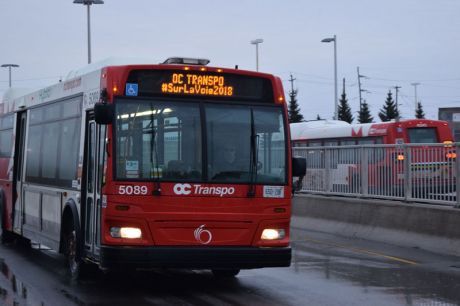Features
You are here
Support free and accessible transit in Ottawa and across Canada

September 14, 2018
At $3.50, fares for Ottawa’s public transit service OC Transpo are the most expensive of any major city in Canada. The annual cost of a transit pass in Ottawa is $1,400 per person, and even the Equipass (intended to make transit more affordable for low-income residents), costs almost $700 a year. For all this expense, Ottawa residents put up with buses that are frequently late, early, or canceled, and endure wait times of up to half an hour. Large areas of the city are so underserved that car ownership is almost a necessity for many. As if these issues weren’t bad enough, the city of Ottawa plans to raise fares by 2.5% per year in order to pay for the costs of its new light rail system.
The city of Ottawa, in raising the prices for public transit, laying off bus drivers in anticipation of light rail, and leaving significant portions of the city underserved, is pursuing a shortsighted set of policies that fail to address the dangers posed by climate change. The Campaign for Free and Accessible Transit is organizing to counter this. Started as an initiative of Solidarity Ottawa, the campaign joined the Healthy Transit Coalition in early 2018, and has grown to include activists from a variety of backgrounds. The campaign advocates for universal, fare-free public transit in Ottawa, in order to improve mobility and quality of life for low-income and vulnerable people, and as part of broader strategy to fight climate change.
Strategy
Multiple studies have demonstrated that removing the fare box on its own will not be enough to get people out of their cars and into public transit. At an individual level, the use of an automobile seems to provide the commuter with a fast and convenient way to get around. But as automobile usage increases, the overall effect for the population as a whole is increased pollution, frustration, and wasted time—as commuters spend an average of close to 80 hours per year sitting in traffic delays.
Compared to most alternative transit options, automobiles are significantly more toxic for the environment, put a larger strain on social infrastructure, and put commuters and pedestrians at greater risk of injury or death from road accidents. And yet, automobile use is effectively subsidized as a result of economic policy and the inability of the capitalist system to account for the wider social effects of individual choices and economic transactions. So it is not surprising that more than simply removing the fare box is required. For this reason, the campaign is arguing for significant improvements in service that will make public transit a more viable alternative to car ownership.
At the same time, the campaign recognizes that to fully realize the potential of free public transit, the policies that subsidize automobile use will need to be phased out. Free transit thus has to be seen as part of a larger project to reconstruct how people get around, both in Ottawa and across the country.
In order to build an activist base the campaign is hosting a series of rider’s forums in selected neighborhoods, aiming to found an independent and democratically-run city-wide rider’s association that can fight for the interest of transit users across Ottawa. In addition, the campaign is reaching out to the Amalgamated Transit Union (ATU), which represents Ottawa bus drivers, with the aim to form a rider-driver alliance to fight driver layoffs and improve service.
Perhaps the most significant objection to fare-free public transit is cost. In Ottawa the elimination of transit fares would require the city to generate roughly $180 million per year to cover the budget shortfall. That comes out to approximately $200 per person per year for every Ottawa resident. To cover this cost, the campaign has suggested increasing parking fees, imposing charges on developers for the costs of investments in city infrastructure required by their projects, shifting some of the money spent on roads to public transit, and finally, some increases in property taxes. In order to achieve the improvements in public transit required to make the transition away from a car-based transportation system, the campaign rightly argues that provincial and federal governments will need to provide additional funding.
The project to replace a profit-driven, systemically irrational, expensive, dangerous and ecologically unsustainable car-centered transportation system with a public transit system that is efficient, accessible to all, safe, and ecologically sustainable is something all socialists should be able to support.
For more information visit the Campaign for Free/Accessible Public Transit
Section:









